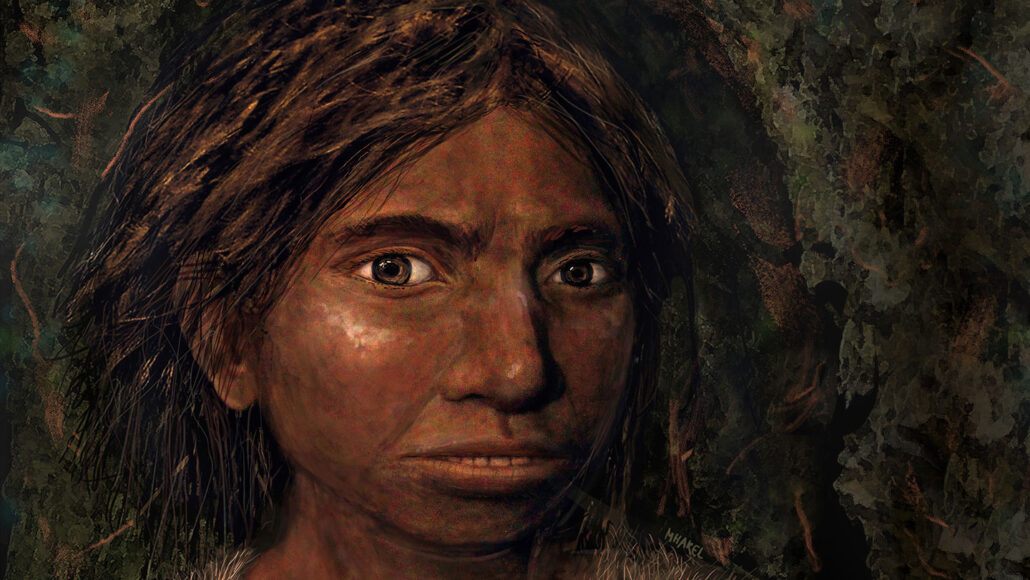ancestor: A predecessor. It could be a family forebear, such as a parent, grandparent or great-great-great grandparent. Or it could be a species, genus, family or other order of organisms from which some later one evolved. For instance, ancient dinosaurs are the ancestors of today's birds. (antonym: descendant)
common ancestor: Also known as shared ancestor. It's an ancestor that two or more descendants have in common. Two siblings share a parent as a common ancestor. This also applies on the level of species and groups of organisms. Two or more species can share a common ancestor at the genus level. Two or more genera can share a common ancestor at the family level, and so on. Tigers and lions have a common ancestor, as do humans and Neandertals.
Denisovans: An ancient humanlike population whose existence is known only from a few fossils discovered in a cave in Siberia and from ancient DNA.
DNA: (short for deoxyribonucleic acid) A long, double-stranded and spiral-shaped molecule inside most living cells that carries genetic instructions. It is built on a backbone of phosphorus, oxygen, and carbon atoms. In all living things, from plants and animals to microbes, these instructions tell cells which molecules to make.
Eurasia: That part of the globe covered by Europe and Asia.
extinct: An adjective that describes a species for which there are no living members.
fossil: Any preserved remains or traces of ancient life. There are many different types of fossils: The bones and other body parts of dinosaurs are called “body fossils.” Things like footprints are called “trace fossils.” Even specimens of dinosaur poop are fossils. The process of forming fossils is called fossilization.
gene: (adj. genetic) A segment of DNA that codes, or holds instructions, for a cell’s production of a protein. Offspring inherit genes from their parents. Genes influence how an organism looks and behaves.
hominid: All modern and extinct great apes. Living examples include humans, chimpanzees, gorillas and orangutans. The group also includes up to 19 species of prehistoric relatives of humans, such as Australopithecus, Paranthropus and Ardipithecus. The group has a lot of overlap with hominins. The difference: Hominins do not include currently living great apes other than humans.
Homo: A genus of species that includes modern humans (Homo sapiens). All had large brains and used tools. This genus is believed to have first evolved in Africa and over time evolved and radiated throughout the rest of the world.
native: Associated with a particular location; native plants and animals have been found in a particular location since recorded history began. These species also tend to have developed within a region, occurring there naturally (not because they were planted or moved there by people). Most are particularly well adapted to their environment.
Neandertal: A species (Homo neanderthalensis) that lived in Europe and parts of Asia from about 200,000 years ago to roughly 28,000 years ago.
plateau: A flat area of land, high above sea level. It’s sometimes referred to as “tableland.” Several of its edges tend to be steeply sloped (cliffs).
Siberia: A region in northern Asia, almost all of which falls within Russia. This land takes its name from the language of the Tatar people, where Siber means sleeping land. This region is vast. It has become famous for its long, harsh winters, where temperatures can fall to −68° Celsius (−90° Fahrenheit).
species: A group of similar organisms capable of producing offspring that can survive and reproduce.
Tibetan plateau: The planet’s highest plateau, it has an average elevation of 4,500 meters (nearly 14,800 feet). Known as the Roof of the World, the “third pole” (after the North and South poles), and the Asian water tower, it is a cold, snowy region in southwestern China that includes all of Tibet. The water that melts from ice and snows here will go on to provide drinking and irrigation water for hundreds of millions of people downstream.

